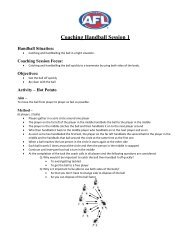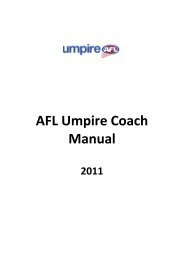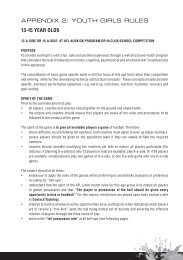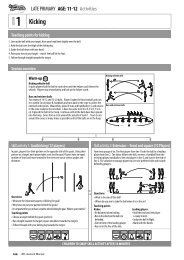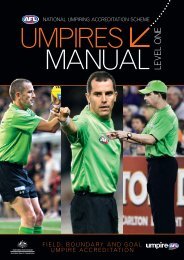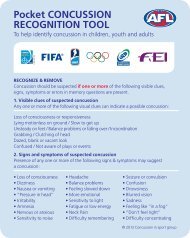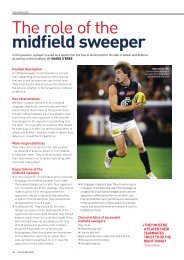AFL UMPIRE MENTOR PROGRAM MANUAL - AFL Community
AFL UMPIRE MENTOR PROGRAM MANUAL - AFL Community
AFL UMPIRE MENTOR PROGRAM MANUAL - AFL Community
- No tags were found...
You also want an ePaper? Increase the reach of your titles
YUMPU automatically turns print PDFs into web optimized ePapers that Google loves.
Providing match feedbackSome important advice on communicationCommunicating with children or teenagersAs much of your role as a mentor will require you to communicate with teenagers, it isappropriate to examine some of the more important aspects of this. We will examine some ofthe more general rules about communication – those that apply to all situations, those thatapply to children and those that apply to adults. The following section should help shape theway you communicate with the beginning or learning umpire, during the match and aftermatches or at training, both verbally and in writing. Remember, communication is a skilland, like all other skills, requires practise and reflection to improve.Some tips about communicating with childrenand teenagers:Draw young people out to speak about the things on their minds. If theperson you are mentoring seems to be a little upset about a particularmatch or aspect of a match, work on getting him or her to verbalise whatis going through his or her head.You can ‘prime the pump’ by talking with them about their favouritefoods, toys, movies, video games, etc. Basically, this means starting withsomething a little more informal, then moving on to the aspect of thegame or performance you wish to address.Verbally reflect on the emotions of a young person before givingin to your need to teach him or her something. You can do this byparaphrasing – repeating what they have said, but in your own words –to ensure you have got the message straight.Adults are constantly making the error of educating young people whenthat person expresses pain. “I had an absolute shocker today – I don’tthink I can make it as an umpire” is often met with, “You did fine” andthe child may be left to feel all alone with what could become a problemfor them. It is important to deal with the negative feelings of poorperformance, because he or she will have bad days even if they make itto the top.Lower yourself physically to a young person’s level by sitting down,bending down or sitting on the floor.It may have been months since any adult has joined the young personon his or her own level. Sit with them on the bench after a game ratherthan stand over them and talk down to them.Tell the young umpire anecdotes about your past and/or presentexperience as an umpire.<strong>UMPIRE</strong> <strong>MENTOR</strong> <strong>PROGRAM</strong> <strong>MANUAL</strong> 33



